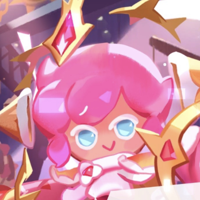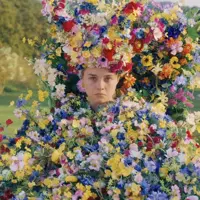Eternal Sugar Cookie (영원한 설탕 쿠키) tipo de personalidade mbti
Personalidade
"¿Qué tipo de personalidad es Eternal Sugar Cookie (영원한 설탕 쿠키)? Eternal Sugar Cookie (영원한 설탕 쿠키) es un tipo de personalidad ENFJ en mbti, 2w3 - SO7 - 297 en enneagram, SCOAN en Big 5, EIE en Socionics."
[ETERNAL SUGAR COOKIE AS SOCIAL SEVEN – 1/?] I. At the beginning of the plot, HB and her group falls into a beasts trap, where ESC’s subordinate (Pavlova Cookie) brings them to her garden to heal their wounds. When Pavlova got angry and wasn’t going to let HB and her group go under pretence that «there is no happiness outside this garden», ESC scolded her ostentatiously, telling Pavlova that he was crossing the line and behaving disgustingly, needing to be reeducated. - ESC: Please excuse Pavlova Cookie. He has stepped out of line. - ESC: Think about what you did, Pavlova Cookie. Why exactly does it look ostentatious? This proof given above serves to illustrate ESC’s internal conflict between her gluttony and her desire for virtuous activities. SO7 are fully aware of their gluttony, decrying it, and so they are the most disciplined in controlling their excesses. Mentioned above explanation of the plot is an implicit example of how she denies her gluttony, as well as the negative aspects of her being, striving to appear perfect. She «ostentatiously» punishes Pavlova Cookie, and the reason for it is that, as it will be known later, ESC created a trap for the HB group. She decided to completely control them, striving to turn them into part of her heavenly garden, so that they could live in peace, leaving their worries and efforts for a peaceful rest. She created specific conditions for her manipulations in order to attract them to her ideology. HB’s group, including her, were required to be in her garden, but she denies this, giving everyone the opportunity to «freely» choose, whether they want to leave, or not. But at the same time, she poisoned them with a sweet scent so that the beasts attacking them will initially bite them once again; the same ones return to her for healing (sacrifice). Through an act of action, conversation and help, she could’ve guided them towards the idea that her garden was the perfect place to stay. Thus, she contradicts herself, punishing Pavlova Cookie for the idea she follows as well. She denies everything perfect, while also practicing it herself, hiding her gluttony. By creating conditions in which the HB’s group find themselves in difficult circumstances again and find a way out only in her company, she feeds her heavenly garden with which she identifies herself. She hides her true intentions under an image of a blessing, which leads to a mechanism of reverse obedience and duty – to thank and bless ESC for her help. [ 1 – ESC: Oh dearest… The Happiness of Cookies is so quaint… so trivial… I can make all their wishes come true with ease~ ] [ 2 – HB: You…! You «blessed» that Cookie with a sweet scent, knowing that beasts would be attracted to it… - ESC: Mhm! Some cookies need a little push… Sometimes, true Happiness is born through trial and error~ - ESC: I figured you would enter my paradise voluntarily, but I underestimated the loyalty of your friend! ] SO7: 1 - If I don't sacrifice myself I can't exist because I can't get love and recognition from others. I must establish relationships where I give more than I receive, so that others are always in my debt. I am a good being who sacrifices myself for others: if I show myself like this, others accept me, if I show my real interests, others will reject me. I feel weak with the confrontation of others, that's why I create the conditions of manipulation that allow me to rebalance the situation. If I am always available, the others accept me, and if this involves an effort, it doesn't matter. I sacrifice myself. (XAVIER) 2 - Narcissistic pain avoidance and narcissistic pleasure-seeking can take on a myriad of nuances. In the SO7, gluttony assumes, as we say, a specific form: the need to look extraordinary. And there are two fundamental mirrors: that of the world and that of the ideal self, that of the other and the intimate. Given the centrality of the mental experience in this character, sight is the main door for his relationship with the world. In addition, seeing oneself refers to the mirror stage, when the child looks into the mother's eyes and she gives him a reflection, made up of feelings and words, which he will later confuse with his identity.
Biografia
Previously revered as the Sugar of Happiness, Eternal Sugar Cookie once supplied mortal Cookies with Joy through granting them various delights. With time marching on and Cookies nonetheless falling to pain and despair, she began to believe that the world's fragile Cookies cannot achieve true Happiness in the infinite suffering of everyday life. Still claiming to be the Bringer of Happiness, Eternal Sugar Cookie now oversees the paradisaical Garden of Delights and works towards a day when all Cookies can live in blissful, indolent escapism free from deep thought and mundane worries.
Personalidades relacionadas

Shadow Milk Cookie (쉐도우밀크 쿠키)

White Lily Cookie (세인트릴리 쿠키)

Pure Vanilla Cookie (퓨어바닐라 쿠키)

Strawberry Crepe Cookie (딸기크레페맛 쿠키)

The Player (Vote Your Type)

Burning Spice Cookie

Black Pearl Cookie (블랙펄 쿠키)

Fire Spirit Cookie (불꽃정령 쿠키)
















